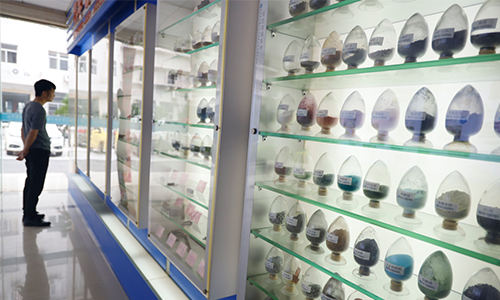SOURCE / INDUSTRIES
Rare-earth industry moving up industry chain, doesn’t seek monopoly: executive

A representative from local enterprises look at the display case of rare-earth metals and oxides at the National Center of Quality Supervision and Inspection for Tungsten and Rare Earth Products (NCQSIFTREP) in Ganzhou, East China's Jiangxi Province. Photo: Li Hao/GT
The global dominance of China's rare-earth industry reflects expedited moves toward high-end manufacturing, rather than a monopoly tactic, said an executive of a leading Chinese rare-earth company.
China's rare-earth strategy is not aimed at creating a monopoly. The advantages of China's rare-earth industry in the world are built on domestic companies' competitiveness, according to Zhao Dianqing, chairman of China Northern Rare Earth (Group) High-Tech Co.
China's rare-earth industry, which provides more than 80 percent of the world's total supply, has been considered a key potential countermeasure to the US amid the escalating trade war between the two largest economies in the world.
China's rare-earth exports to the US have dropped amid the trade war, and European countries and the US are attempting to shake China's dominance in the area.
Australia has identified 15 rare-earth and critical mineral projects and will cooperate with the US. The UK's Rainbow Rare Earths said that it plans to raise the output of an African rare-earth mine by nearly 19 times, and it won't cooperate with Chinese companies, according to media reports.
Rare earths are strategic resource, but the market is hardly closed. China's rare-earth industry has ranked at the front of the world, and most US companies have failed amid competition, Zhao said in an interview with the Securities Daily published on Monday.
"China's rare-earth industry has a complete industry chain, a significant advantage that foreign enterprises can't surpass in the short term, and foreign companies have much higher exploitation costs," Zhao said.
Rare-earth resources are precious, but given the small consumption, the market is currently oversupplied, Zhao added.
Rare-earth resources, sometimes called industrial vitamins, are an important support for new material manufacturing and key resource for defense technology, but this should not be over-interpreted, Zhao said. Comments such as "rare-earth resources are running out like oil" or "other countries don't exploit rare earths but want to use China's resources" are all rumors.
China's rare-earth industry is transitioning from extensive resource exporting to medium- and high-end refining.
The domestic rare-earth sector has given rise to many research and development institutions with strong innovation capabilities. The patent strength has been rapidly enhanced, and technological innovation will continue to be strengthened, which will consolidate and enhance the existing advantages of the industry, Wu Chenhui, a Beijing-based independent rare-earth analyst, told the Global Times on Monday.

